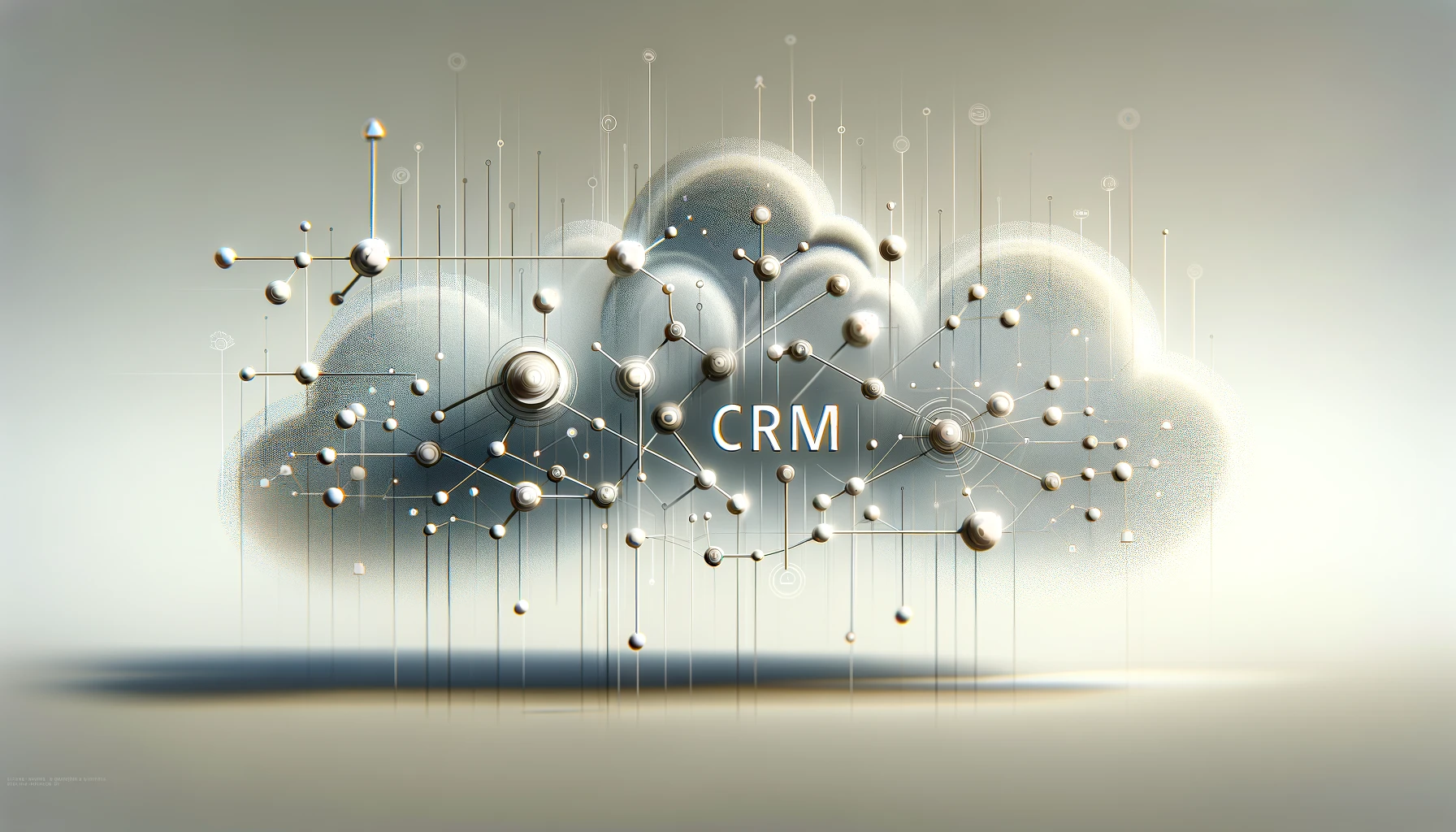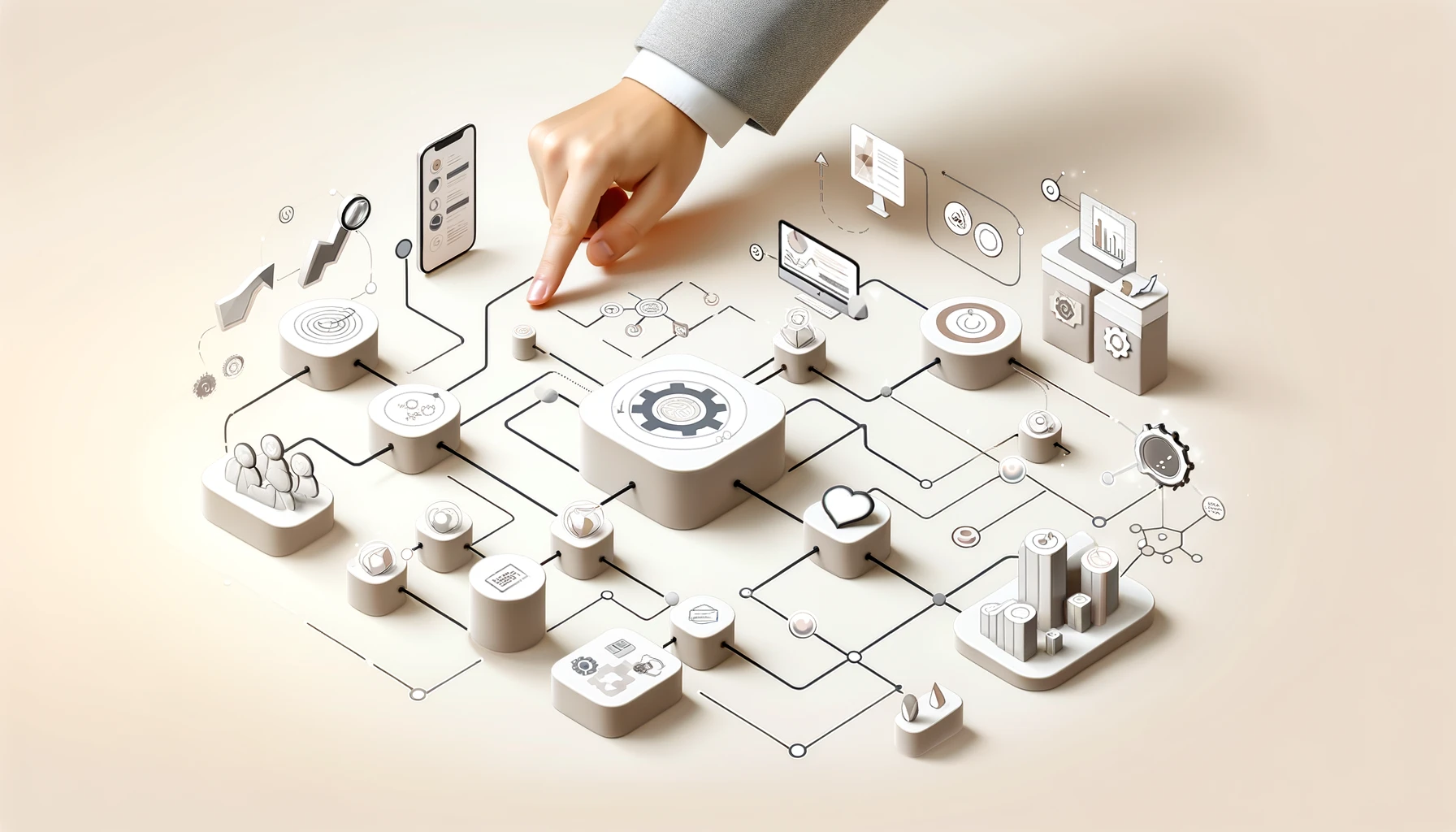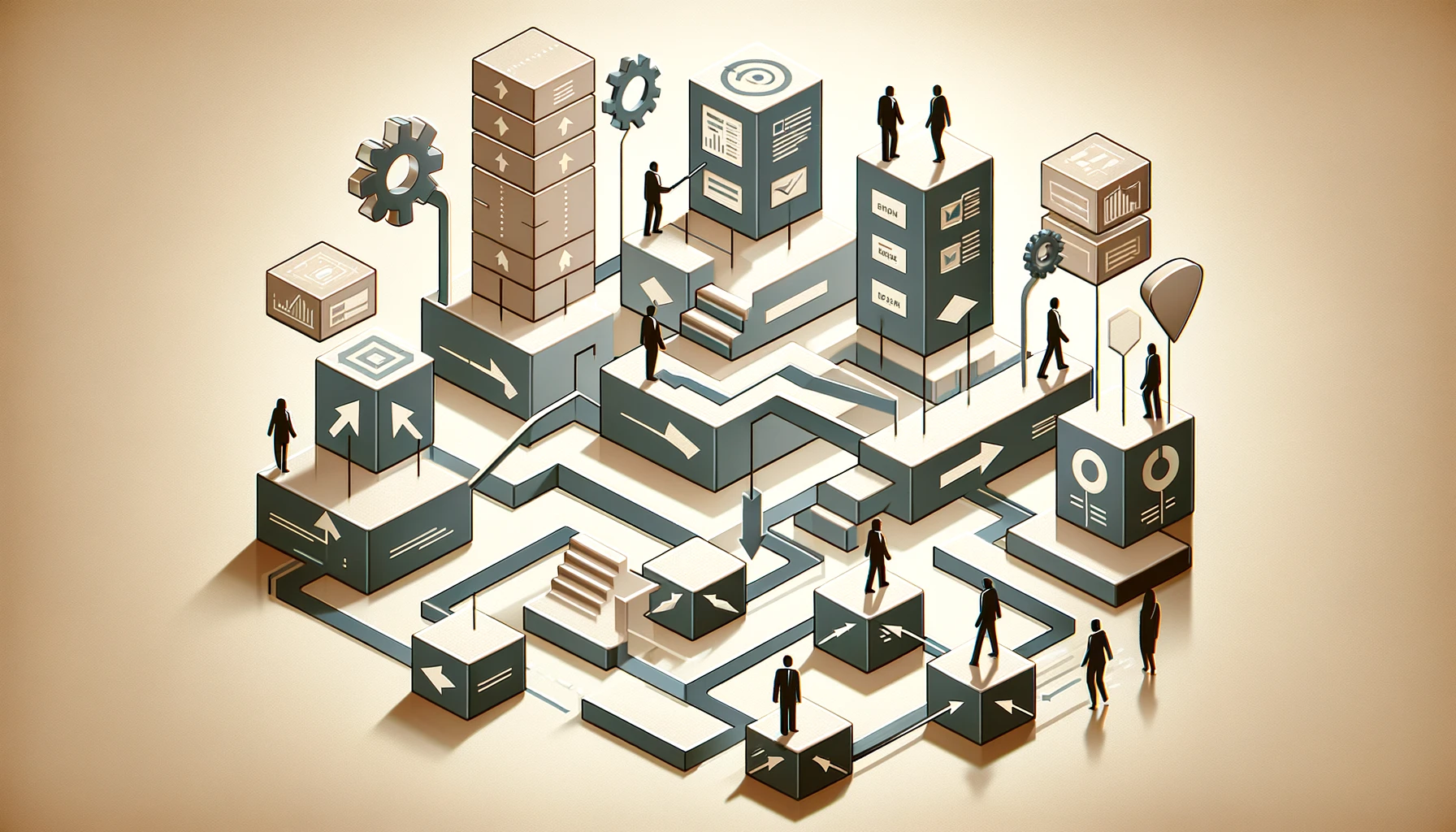CRM Systems Guide: Boost Your Business in 2024

Explore the essence of CRM systems: Transforming customer relations and business growth with effective management solutions.
Unraveling the Meaning of CRM System: A Comprehensive Overview
In the vast ocean of business tools and technologies, understanding the meaning of a CRM system can be a game-changer. At its core, CRM, or Customer Relationship Management, is a comprehensive approach that companies use to manage their interactions with existing and potential customers.
CRM systems, contrary to popular belief, are not just about sales. They encompass all areas of a company that touch customers, including marketing, customer service, business development, and more. They’re like a conduit, connecting various departments and compiling customer data into a single, easily accessible database.

Here are some key features that bring out the essence of a CRM system:
-
Contact Management: This helps a company keep track of all customer information, including transaction history, communication records, and personal details. It ensures that every team member is on the same page when interacting with a customer.
-
Interaction Tracking: A CRM system can document every interaction a company has with its customers, making communication more personalized and efficient.
-
Lead Management: From the first point of contact to the final sale, a CRM system can track the journey of a lead, helping companies identify effective strategies and potential areas of improvement.
One company, for instance, saw a significant improvement in their sales process after implementing a CRM system. Here’s a snapshot of their experience:
| Metric | Before Implementation | After Implementation | Improvement |
|---|---|---|---|
| Sales Cycle Duration (days) | 30 |
20 |
-33% |
| Customer Retention Rate (%) | 60 |
80 |
+33% |
| Revenue Growth (%) | 15 |
25 |
+67% |
In a nutshell, the meaning of a CRM system goes beyond just being a tool. It’s the backbone of customer-centric business strategies, helping companies build stronger relationships with their customers and drive growth.
How CRM Systems Level Up Your Business Game
Understanding the true meaning of a CRM system can significantly level up your business game. A CRM system is not just a tool, but a strategic approach that helps streamline your business processes, improve customer service, and increase profitability.
In the competitive business landscape, companies are always looking for ways to gain an edge. CRM systems offer a competitive advantage by providing a holistic view of customer interactions across various touchpoints. This allows companies to tailor their offerings, improve customer satisfaction, and ultimately, increase sales.
For instance, a CRM system can help a business identify its most profitable customers. By analyzing transaction history and customer behavior, businesses can strategize their marketing efforts to target these high-value customers effectively. This targeted approach can result in higher conversion rates, increased customer loyalty, and ultimately, improved bottom-line performance.
Another significant advantage of CRM systems is in sales forecasting. CRM data can provide valuable insights into sales trends and customer behavior patterns. These insights can guide strategic decision-making, helping businesses to anticipate future demands and plan their resources accordingly.
Furthermore, CRM systems can streamline business processes. By automating repetitive tasks, CRM systems can free up time for your team to focus on more strategic tasks. This not only improves productivity but also enhances the overall efficiency of your business operations.

In essence, a CRM system is a powerful tool that can transform your business operations, making them more customer-centric, efficient, and profitable. So, if you’re looking to level up your business game, understanding the meaning of a CRM system and leveraging its potential can be your secret weapon.
| Business Aspect | Without CRM | With CRM | Improvement |
|---|---|---|---|
| Sales Conversion Rate (%) | 20 |
30 |
+50% |
| Customer Retention Rate (%) | 60 |
75 |
+25% |
| Operational Efficiency (%) | 70 |
85 |
+21.4% |
In conclusion, understanding the meaning of a CRM system and effectively implementing it can significantly enhance your business performance and set you apart from the competition.
CRM Systems: Detailed Explanation and How They Work
CRM systems are akin to the central nervous system of a company, connecting different departments and managing customer interactions. They’re designed to simplify the process of maintaining customer relationships, making the whole process more efficient and effective. Let’s delve deeper into how they work.
CRM systems work by collecting customer data from various sources, including emails, phone calls, social media, and more. This data is then compiled into a unified customer profile, which provides a comprehensive view of the customer’s interactions with the company. This means you can quickly access a customer’s purchase history, communication records, preferences, and more, all from one place.

The CRM system then uses this data to automate various tasks, such as sending follow-up emails, tracking sales opportunities, and managing marketing campaigns. This automation not only saves time but also reduces the risk of human error.
Here’s a breakdown of how CRM systems typically work:
- Data Collection: CRM systems collect data from various sources to create a comprehensive customer profile.
- Data Analysis: The system then analyzes this data to identify patterns and trends.
- Automation: CRM systems automate various tasks based on the analyzed data.
- Reporting: Finally, the system generates reports to provide insights into customer behavior and business performance.
These steps illustrate how CRM systems can significantly streamline your business operations, making them more efficient and effective.
One of the key benefits of understanding the meaning of a CRM system is the ability to leverage its potential to enhance customer service. For instance, by having a complete view of a customer’s interactions with your company, you can personalize your communication and offer tailored solutions. This not only improves customer satisfaction but also fosters customer loyalty.

Moreover, CRM systems can also provide valuable insights into your business performance. By analyzing customer data, you can identify trends, spot opportunities, and make data-driven decisions. This can significantly boost your business growth and profitability.
In essence, a CRM system is a powerful tool that can transform your customer interactions and business operations. By understanding its meaning and how it works, you can leverage its potential to drive your business success.

Benefits and Real-Life Examples of Implementing CRM Systems
Implementing a CRM system can be a game-changer for businesses, providing numerous benefits that can significantly enhance business operations and customer relationships. Here’s a closer look at some of these benefits:
-
Enhanced Customer Service: By providing a comprehensive view of customer interactions, CRM systems allow businesses to offer personalized and efficient customer service. For instance, a company can quickly access a customer’s purchase history and preferences, enabling them to tailor their service to the customer’s needs.
-
Improved Sales Performance: CRM systems can help businesses identify potential sales opportunities and track the sales process, resulting in increased sales efficiency and conversion rates. For example, a company can use the CRM system to track a lead’s journey and identify the strategies that are most effective in converting leads into customers.
-
Streamlined Business Processes: CRM systems automate repetitive tasks, freeing up time for your team to focus on more strategic tasks. This not only improves productivity but also enhances the overall efficiency of your business operations.

Now, let’s take a look at some real-life examples of how implementing a CRM system can significantly impact a business:
-
A retail company implemented a CRM system to manage their customer interactions. The system allowed them to track customer preferences and purchase history, enabling them to personalize their marketing efforts. As a result, they saw a significant increase in customer engagement and sales.
-
A service-based company used a CRM system to streamline their sales process. The system provided them with valuable insights into sales trends and customer behavior, helping them make data-driven decisions. This resulted in improved sales performance and increased profitability.
| Business Metric | Before CRM | After CRM | Improvement |
|---|---|---|---|
| Customer Engagement Rate (%) | 60 |
80 |
+33% |
| Sales Performance (%) | 70 |
90 |
+28.6% |
| Profitability (%) | 20 |
30 |
+50% |
In essence, understanding the meaning of a CRM system and effectively implementing it can significantly enhance your business performance and set you apart from the competition. Whether you’re looking to improve customer service, increase sales performance, or streamline business processes, a CRM system can be an invaluable tool for your business.

Making Business Easier: The Impact of CRM Systems
The transformative potential of CRM systems in the business landscape is truly remarkable. By offering a comprehensive understanding of customer behavior, they empower companies to make data-driven decisions and foster impactful customer relationships.
Consider the case of a company that had been struggling with customer retention. By leveraging a CRM system, they were able to track customer interactions, understand their behavior, and tailor their offerings accordingly. This personalized approach resulted in improved customer satisfaction, leading to a significant increase in their customer retention rate.

Here are some ways CRM systems can make business easier:
- Personalized Marketing: CRM systems allow businesses to understand their customers’ preferences and behaviors, enabling them to tailor their marketing efforts accordingly. This can lead to increased customer engagement and sales.
- Efficient Communication: With all customer data compiled in one place, communication becomes more streamlined and efficient. Businesses can quickly access a customer’s history and preferences, allowing them to provide personalized service.
- Improved Decision Making: The data collected by CRM systems can provide invaluable insights into business performance and customer behavior. This can guide strategic decision-making, helping businesses to anticipate future demands and plan their resources accordingly.
In essence, the meaning of a CRM system extends far beyond a mere business tool. It’s a strategic approach that can significantly enhance business operations, making them more customer-centric, efficient, and profitable.

To illustrate the impact of CRM systems, let’s look at some key business metrics:
| Business Metric | Before CRM | After CRM | Improvement |
|---|---|---|---|
| Customer Retention Rate (%) | 60 |
80 |
+33% |
| Sales Conversion Rate (%) | 20 |
30 |
+50% |
| Operational Efficiency (%) | 70 |
85 |
+21.4% |
These figures clearly demonstrate how understanding the meaning of a CRM system and effectively implementing it can significantly enhance business performance. Whether you’re looking to improve customer service, increase sales performance, or streamline business processes, a CRM system can be an invaluable tool for your business.
Getting Started with CRM: A Simple Guide for Businesses
Adopting a CRM system can seem like a daunting task, particularly for those who are new to this technology. However, with the right approach, the process can be straightforward and beneficial. Here’s a simple guide to help you get started.
Firstly, define your goals. What do you want to achieve with a CRM system? Whether it’s improving customer service, increasing sales, or streamlining operations, having clear objectives will guide your CRM implementation process.
Next, gather your team. The implementation of a CRM system is a team effort, requiring input from various departments. Ensure all relevant team members are involved in the process, from decision-making to training.
Then, select a CRM system that aligns with your business needs. There are various types of CRM systems available, each with their own features and benefits. Research and compare different options to find the one that best suits your business model and objectives.
Once you’ve selected a CRM system, it’s time to get your data in order. Cleanse your existing data, removing any duplicates or outdated information. The accuracy of your data will greatly impact the effectiveness of your CRM system.
Finally, implement and train. Once your CRM system is set up, it’s crucial to train your team on how to use it effectively. Regular training and support will ensure your team feels confident in using the system, maximizing its benefits.
Here’s a simple breakdown:
- Define your goals
- Gather your team
- Select a CRM system
- Cleanse your data
- Implement and train
Remember, the key to successful CRM implementation lies in understanding the meaning of a CRM system and how it aligns with your business objectives. With the right approach, a CRM system can transform your business operations, making them more efficient, effective, and customer-centric.
Let’s look at some statistics that demonstrate the impact of a well-implemented CRM system:
| Business Metric | Before CRM | After CRM | Improvement |
|---|---|---|---|
| Sales Conversion Rate (%) | 20 |
30 |
+50% |
| Customer Retention Rate (%) | 60 |
80 |
+33% |
| Operational Efficiency (%) | 70 |
85 |
+21.4% |
These figures clearly illustrate the transformative potential of a CRM system. So, if you’re ready to level up your business game, start your CRM journey today!
FAQs
-
How Do CRM Systems Enhance Business Efficiency? CRM systems streamline business processes by centralizing customer information, which enhances efficiency in managing client relationships, sales tracking, and marketing efforts. This consolidation of data aids in quicker, more informed decision-making and operational optimizations.
-
What Impact Does CRM Have on Customer Engagement? CRM tools play a pivotal role in elevating customer engagement. They provide detailed insights into customer behaviors and preferences, enabling personalized interactions and targeted marketing strategies, which lead to improved customer satisfaction and loyalty.
-
How Does CRM Revolutionize Marketing Strategies? CRM systems revolutionize marketing strategies by offering detailed analytics and customer segmentation. This allows businesses to create more tailored marketing campaigns, track their effectiveness, and adjust strategies in real time for maximum impact.
-
Can CRM Systems Improve Sales Performance? How? Yes, CRM systems significantly improve sales performance. They provide sales teams with valuable customer insights, streamline the sales process, and enable better follow-up strategies. This results in more effective sales pitches, higher conversion rates, and enhanced customer retention.
-
Are CRM Systems Suitable for All Types of Businesses? CRM systems are versatile and can be adapted to various business sizes and types. They offer scalable solutions that can grow with the business, making them suitable for startups, SMEs, and large enterprises across different industries.
Read more about low-code platform ozma.io
CRM for Beginners: Easy to Start!
CRM for Photographers: More Clients and Efficiency





